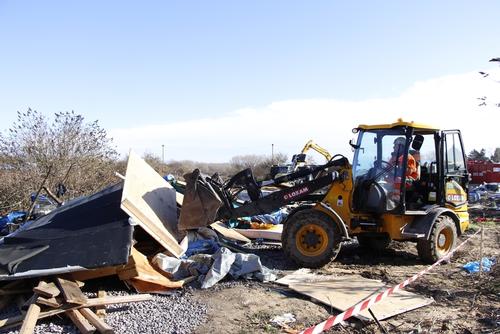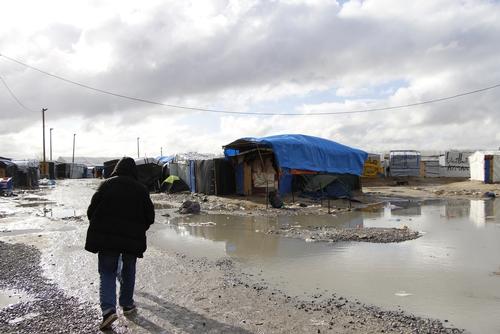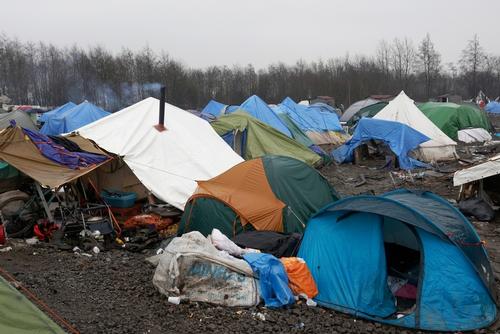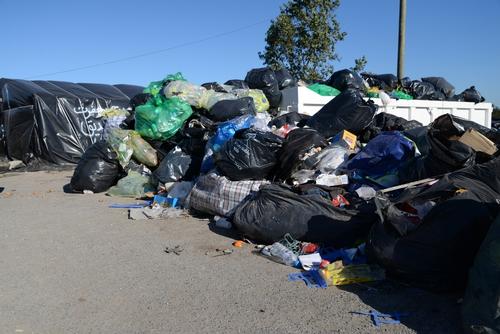Scores of police vehicles surround the Jungle. Police stand guard, blocking the southern entrance to the camp, and no one is allowed through.
From the outside, it might appear as if the riot police have cordoned off a huge crime scene, with officers dressed in black from head to toe waiting to catch a band of hated criminals.
But inside is a completely different story. The people inside are victims of war and poverty, who decided many months ago to take destiny into their own hands and travel thousands of kilometres in hope of a new life. They have been living in the Jungle camp, near the northern French port city of Calais, for weeks or months, desperately waiting for a chance to be smuggled into Britain.
Now, they are being evicted from the southern half of the camp, which is notoriously squalid, but which they have come to call home.
Eviction Order
Starting 29 February, implementing an eviction order issued by the French judiciary, officials went into the Jungle and started telling hundreds of asylum seekers it was time to go.
Speaking in English in short, unkind outbursts and wearing vests ironically bearing the words “Liberte, Egalite, Fraternite”, these officials were escorted by riot police officers wearing black uniforms and helmets. The police officers carried tear gas guns, and some had rows of canisters strapped to their chests. Others walked with shields and brandish sticks.
The officials showed little kindness to those who complied, and watched as police sprayed tear gas and beat those who did not.
The officials’ role was to clear the camp of its residents for the bulldozers, hammers and saws to come in and do the razing — even though Interior Minister Bernard Cazeneuve had explicitly promised there would be no bulldozers.
The sheer sight of the police frightens everyone in the Jungle equally — men, women and children.
Some people, feeling stripped of what little dignity they had left, obey orders and leave their temporary homes with little fuss.
Others resist.
Some migrants burn down their tents, in a final act of defiance as they move out. Some refuse to leave and clash with police, who fire tear gas and unleash water cannon at the crowds.
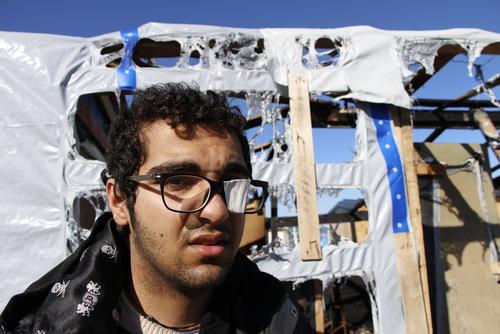
Ali, from Iran, is 17 years old, and he’s been in the Jungle for four months. During the chaos that erupted during the evictions, a policeman threw him down onto the muddy ground as he tried to escape from the tear gas, he said.
Two other officers then beat him, hurting his hand and breaking his glasses. Now, Ali has a cut near his eye from the broken glass, and he’s having difficulties breathing. “I can’t breathe," he said. "I am in pain, I am dizzy, and I have nowhere to sleep.”
Ali is among 25 people who were given first aid at MSF’s new clinic in the Jungle. According to MSF nurse Pierre, there were many people suffering from breathing problems because of the tear gas.
Some resort to more extreme methods of resistance, fearful that even if they were to file for asylum in France they would be rejected because of their country of origin. Mohammad Reza, a 43-year-old who has been in the Jungle for four months, is among a group of eight fellow Iranians who have sewed their lips together and gone on hunger strike.
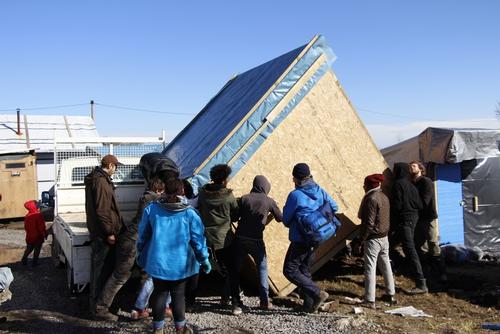
‘Worst possible option’
Some of those who were evicted have left France for Belgium, from where they will try to reach Britain.
Others have given up on ever reaching Britain and gone to Germany, while only a handful have settled for applying for asylum in France — which they see as the worst possible option for a migrant, judging from the poor treatment they receive in the camp.
Another possibility is to move into the shipping containers centre that feels prison-like, and where they are surrounded by a tall fence and cameras. No visitors are allowed in, and in order to register migrants must be fingerprinted.
Nasser is a 27-year-old from Kuwait where he, like other members of the Bedoun (stateless) community, had no rights. He has now spent seven months in the Jungle, waiting for a chance to reach Britain, where he believes a better life awaits. Like many others in the camp, he does not know what he will do next, but he is certain he won’t be applying for asylum here.
“After all they did here to the poor Iranians, Afghans and Kurds… After that they expect us to apply for asylum in France, or to be at their mercy in the containers? France is against refugees.”
One of the tents taken down last week belonged to Ahmad, a 28-year-old former business manager from Iran. He too refuses to move into the containers because he fears that if he is fingerprinted he might end up unable to seek asylum in Britain.
Like Nasser, he doesn’t want to apply for asylum in France because he believes it is “a bad country for asylum seekers.”
“Look at what they did to us. They are bad, they are bad,” he said, referring to police. “They beat us, (used) water cannon, pepper spray and tear gas. This is not the Europe that we heard about in Iran.”
So like some of his neighbours, Ahmad believes his best option is to simply find himself a new spot in the northern half of the Jungle, even though fears abound that it may be the next area to face the authorities’ demolition orders.
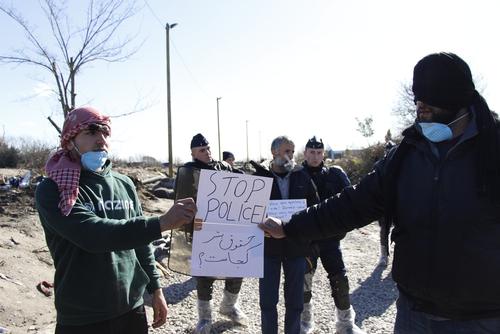
Not giving up
Asylum seekers facing eviction express a mixture of anger, loss and sadness as they wrestle with doubt over what to do next.
Abdul Muttaleb, a 22-year-old from Afghanistan, will not be swayed from trying to reach his mother in the UK.
“Against all the odds, we used to manage in the Jungle. We were trying to adjust to our conditions till we could find a way to join our families in the UK. But even that, they took it from us,” he said.
Abu Jassem, a 20-year-old from Syria, says the number of people in the Jungle has visibly “shrunk” since the eviction wave, with fellow migrants moving on against their wills.
“I am completely lost,” he said, adding that for him it’s “either the UK or back to Syria.”
“When we thought that the situation here was inhumane, we didn’t realise that it could get even worse. We didn’t expect that from France. We used to hear about freedom and democracy. But I don’t think they exist here.”
Ahmad, who comes from Darfur in Sudan, lives in the north of the Jungle, and while he fears that his area may be next in line, he remains defiant, because for people like him, there is no way back home.
“The French police have no humanity. And if the police take away all the Jungle, we will make a new Jungle somewhere,” he said.
“There is no way back to Darfur, and we aren’t going to give up on getting to the UK.”



